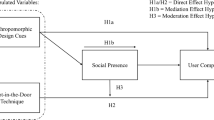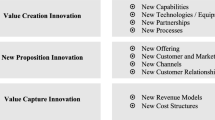Abstract
Arbitration is a preferred method for the resolution of international business disputes. As of yet, most publications on online arbitration deal with legal issues. In this paper, we present an Online arbitration environment that we believe facilitates the participants in a meaningful way. Our assumption is that an ODR service should be easy to use (convenient), and at the same time provide meaningful support. More specifically we have paid attention to four criteria that we believe are important, viz. simplicity, awareness, orientation and timeliness. The online arbitration service is called GearBi.
Similar content being viewed by others
References
Blanchard R. E. (1993). Situation awareness–transition from theory to practice. In: Proc. of the Human Factors and Ergonomics Society: 32nd Annual Meeting. Santa Human Factors and Ergonomics Society, Monica, CA, pp. 39–42.
Carroll J. M., Neale D. C., Isenhour P. L., Rosson M. B., McCrickard D. S. (2003), Notification and Awareness: Synchronizing task-oriented collaborative activity. International Journal of Human-Computer Studies 58(5):605–632
Chi, E. H. P. and Pirolli, J. Pitkow (2000). The scent of a site: a system for analyzing and predicting information scent, usage, and usability of a Web site, Proceedings of the SIGCHI conference on Human factors in computing systems, pp. 161–168, April 01–06, 2000, The Hague, The Netherlands.
Dufner, D., Kwon, O. and Hadidi, R. (1999). Web-CCAT: A collaborative learning environment for geographically distributed information technology students and working professionals. Communications of the Association for Information Systems, Vol. 1, No.␣12, March 1999.
E-Arbitration-T (2002). E-Arbitration-T Project: An Alternative Dispute Resolution for SMEs. World Arbitration Newsletter, Number 2, June 2002. Available at http://www. e-global.es/arbitration
Endsley M. R. (1995). Toward a Theory of Situation Awareness in Dynamic Systems. Human Factors 37(1):32–64
Grover, A. (2002). More Security is Needed For Online ADR Applications, 20 Alternatives to High Cost Litig. 135
Gutwin, C. and Greenberg S. (1998). Effects of awareness support on groupware usability, Proceedings of the SIGCHI conference on Human factors in computing systems, pp.␣511–518, April 18–23, 1998, Los Angeles, California, United States.
Hill, R. (1999), Online arbitration: Issues and Solutions, Arbitration International, April 1999 issue, <http://www.umass.edu/dispute/hill.htm>
Hunt, A. and Thomas, D. (2000). The Pragmatic Programmer. Addison–Wesley.
Katsh E., Rifkin J. (2001) Online Dispute Resolution: Conflict Resolution in Cyberspace. Jossey-Bass 2001, San Francisco
Kaufmann-Kohler G., Schultz T.(2004) Online Dispute Resolution: Challenges for Contemporary Justice. Kluwer Law International, The Hague
Lodder, A. R. and Vreeswijk, G. A. W. (2004). ‘Online Arbitration Services at a Turning Point: An Appraisal’, ICC International Court of Arbitration Bulletin, Special Supplement ‘Using Technology to Resolve Business Dispute, pp. 35–42.
Lodder, A. R. and Huygen, P. E. M. (2001). ‘eADR: A Simple Tool to Structure the Information Exchange Between Parties in Online Alternative Dispute Resolution’. In Verheij, B. et al. (eds.), JURIX 2001, IOS Press, pp. 117–129.
Lodder A. R. (1999). DiaLaw. On Legal Justification and Dialogical Models of Argumentation. Kluwer Academic Publishers, Dordrecht/Boston/London
Lodder, A. R. (2004). ‘Information Security & Online Dispute Resolution’, Proceedings of Symposium Putting ICT into dispute resolution practice, London, September 6, 2004.
Nakano R. (2001) Web Content Management: A Collaborative Approach. Addison–Wesley, Boston
Online Arbitration: What Technology can do for Arbitral Institutions. Introductory document for a January 20th 2003 one-day seminar organized by the E-Arbitration-T consortium.
Oskamp, A., Lodder, A. R. and Apistola, M. (eds.) (2004). IT Support of the Judiciary: Australia, Singapore, Venezuela, Norway, The Netherlands and Italy, TMC Asser Press/Cambridge University Press.
Philippe, M. (2004). ‘NetCase: A New ICC Arbitration Facility’, ICC International Court of Arbitration Bulletin, Special Supplement ‘Using Technology to Resolve Business Dispute’, pp. 53–58.
Preece J., Rogers Y., Sharp H. (2002) Interaction Design: Beyond Human–Computer Interaction. John Wiley and Sons, New York, NY
Rule C. (2002) Online Dispute Resolution for Businesses. Jossey-Bass, San Francisco Ca
Schäfer, E. (2003). ‘Videoconferencing in arbitration’, ICC International Court of Arbitration Bulletin, Vol. 14, No. 1, Spring, pp. 35–45
Schäfer, E. (2004). ‘IT in Arbitration: The Work of the ICC Task force’, ICC International Court of Arbitration Bulletin, Special Supplement ‘Using Technology to Resolve Business Dispute, pp. 59–62.
The Standards, Operating Standards for Using IT in International Arbitration (2004). ICC International Court of Arbitration Bulletin, Special Supplement ‘Using Technology to Resolve Business Dispute, pp. 75–98.
Vreeswijk, G. A. W. (1993). Studies in Defeasible Argumentation. PhD thesis, Dept. of Mathematics and Computer Science, Vrije Universiteit Amsterdam.
Vreeswijk, G. A. W. (2003). ‘A Simple Scheme to Structure and Process the Information of Parties in Online Forms of Alternative Dispute Resolution’, ADR Online Monthly, October 2003.
Wahab M. (2004) The Global Information Society and Online Dispute Resolution: A New Dawn for Dispute Resolution. Journal of International Arbitration 21(2):143–168
Yu H., Motassem N (2003) Can Online Arbitration Exist Within the Traditional Arbitration Framework. Journal of International Arbitration 20(5):455–473
Author information
Authors and Affiliations
Corresponding author
Rights and permissions
About this article
Cite this article
Vreeswijk, G.A., Lodder, A.R. GearBi: Towards an online arbitration environment based on the design principles simplicity, awareness, orientation, and timeliness. Artif Intell Law 13, 297–321 (2005). https://doi.org/10.1007/s10506-006-9015-z
Published:
Issue Date:
DOI: https://doi.org/10.1007/s10506-006-9015-z




